For a brief moment in the late 90s, the Capital City was on the verge of being the next ‘big’ music scene — and a group of devil-may-care mountain boys were at the center of it all
Several years ago, on a gusty spring night in Midtown, a crowd packed into Fox and Goose Pub, hoping that this time the “forever fever” wouldn’t break.
Damon Wyckoff and Mason DeMusey, the songwriters behind Sacramento’s original rockabilly rural rebellion, Forever Goldrush, were performing together after a long hiatus. What was missing from the reunion was guitarist Josh Lacey. Fans were so happy to see a live performance that they settled for two-thirds of the band’s heartbeat.
And the duo didn’t disappoint.
Wyckoff nodded and hit the first notes of “Skeleton Keys.” His reverberating guitar chords swiped bright and loud — a spacious, high-breathing rhythm that DeMusey filled with crisp, intense picking. Wyckoff’s voice pushed through the microphone, that low, hardened tenor of the hills sharpened with a sonorous edge. His acoustic got louder. The audience heard his throat come through it in a yearning growl: “Wanna to come out / from the underground?”
The room was hooked as the dual strumming rose into a bold, striding swing.
Next, the pair turned to “Shadow She Walks In,” a tune that went all the way back to the first days of Forever Goldrush playing coffee houses and open mics in the city. With a saw-tooth sharpness to its rift and a backwoods brilliance in its melody, “Shadow She Walks In” was the final track on the band’s debut album, Unknown Territory. That song collection launched a movement in Sacramento — a proof of concept that the quirky irony of Cake and power-punch of Oleander weren’t the only avenues of breaking out nationally.
Indeed, Forever Goldrush was everything Sac’s radio sensations of the late 90s and early 2000s weren’t. Rather than following or reacting to grunge, it looked for insights in the blond, grassy creek-canyons along Highway 49. Hence its songs found meaning in the mildewed past – in that white-knuckle, boom-and-bust spirit of the surrounding foothills. Similar to their friends in Jackpot — Sacramento’s other group of alt-country renegades — Forever Goldrush was signed by one of the top indie labels in the U.S. They were soon in Nashville, jamming alongside the likes of Lucinda Williams and Hank Williams III.
“It was truly surreal,” Wycoff recalled of their ascent.
But the life of a musical road warrior proved too much for all involved. On the cusp of becoming a national act, Forever Goldrush tilted into a nosedive so gently subtle few even realized it was happening. Yet the band’s audience in Northern California has never diminished. That spring evening when Wyckoff and DeMusey appeared at Fox & Goose marked one of several brief stints that thrusted them back into the regional spotlight.
Now, the band is marking its 25th anniversary by re-releasing Unknown Territory on all digital platforms as it starts work on a brand-new album.
“Obviously, when we put ‘Unknown Territory’ out these platforms didn’t exist, and it was a record that was sold out of the back of a van and off of stages after shows,” Lacey noted. “This is going to make it widely available in a whole new way.”
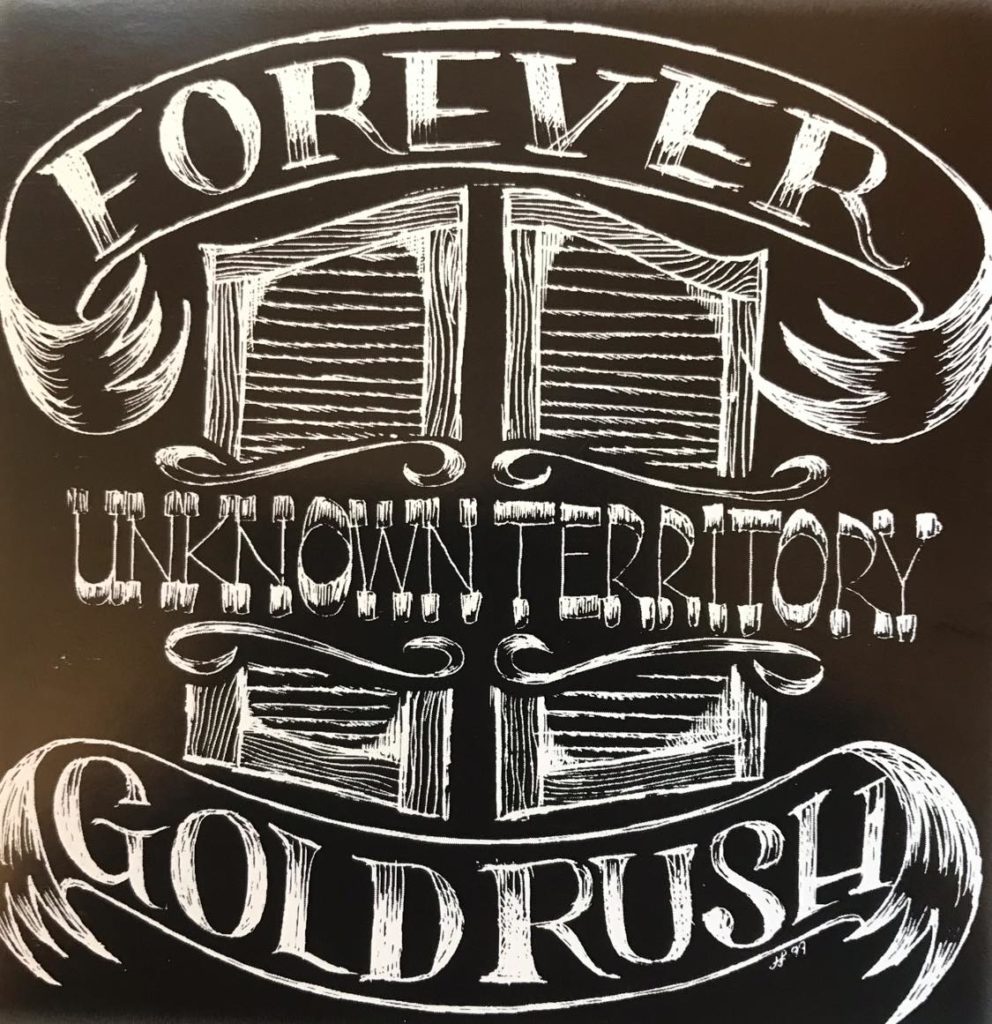
From a hill town to an urban crater
Lacey, Wyckoff and DeMusey grew up together in the former mining community of Amador, some 40 miles east of Sacramento. Wyckoff was raised by a single mom who had a steady stream of Neil Young and the Rolling Stones blasting on her stereo. DeMusey’s house looked out on a concrete dam filled with toxic mine tailings, the dormant remnants of a long-abandoned economy whose shadows remained. He contemplated the sight while getting addicted to the Grateful Dead and Crosby, Stills & Nash.
Wyckoff and DeMusey started playing guitar and bass, respectively, in their teens. By 19, Wyckoff was working on his own compositions tinged with the hollowed-out, broken beauty of backwoods life.
“For me, as a songwriter, where I grew up was the driving force,” Wyckoff remembered. “Walking through the hills to come across old mine shafts, or just waking up on a cloudy day to see the green, rolling hills — I always knew, even when I was young, that it was special. And it’s really that sense of place I’ve wanted to invoke audibly.”
Lacey, who was from the mountains above Wyckoff and DeMusey, was also affected by the place, though it took decades for him to realize it.
“When I was young, all I could think about was how fast I could break out of there,” he admitted. “But there is a rural, rootsy feel to what we put out, and I think that probably was infused in me by growing up in that environment. When you’re in a place where life’s a little slower, and nature’s all around, you just absorb that into your soul.”
The trio joined forces with mandolin player Whit Burton to create the first incarnation of Forever Goldrush. They mostly played parties, including one at a place called Dead Doll Ranch, which was a hidden homestead with turkey vultures on its fence posts and weathered, eyeless baby dolls strewn across its barbed wire.
“It was a little wild back then,” DeMusey reflected. “Those were real parties, with people drinking and jumping out of windows. I was still really young. I was just kid along for the ride.”
The musicianship was going well, but the band was still living a hardscrabble existence. DeMusey eventually found himself pitching a makeshift camp for months inside a construction crater in downtown Sacramento. Everyone soldiered on.
The hand-to-mouth life that swallowed so many of the young, working poor back then was finding an edgy insignia in Forever Goldrush’s first 20 songs. This was the rough-and-ready backbone of two albums that would eventually help define a moment in Sacramento sound. Tunes like “Songs Bottles are Broken To,” “Vicious Ways” and “Sweet 65” were revving, raucous anthems filed down with a jagged prison shiv. Other pieces, including “Still in the Water,” “In My Rebuilding” and “Paint this Town Dry,” were meditations drowned in whisky-warbled blood and poetry. And then there were the dark offerings, “Hard Yard in Fiddletown” and “Spaces in Between,” which proved Wyckoff wasn’t afraid to explore the most troubling corners of his neighborhood’s psyche.
Forever Gold Rush was netting fans everywhere from ranch parties to Sacramento nightclubs; but the story of how their first album got made was straight from the pages of an Elmore Leonard novel. In 1998, a wealthy computer mogul who would often watch the band’s shows at the original Capital Garage — sometimes jumping out of a limousine in a black tuxedo and top hat — offered to pay for the recording and distributing Unknown Territory.
It was the breakthrough they’d been waiting for. The album was released a year later, immediately garnering critical acclaim from the national magazine No Depression. Glowing praises followed from The Chicago Sun-Times, The Sacramento Bee and Exclaim Magazine. Forever Goldrush was launched on a national tour.
“It was huge for us,” Wyckoff said.
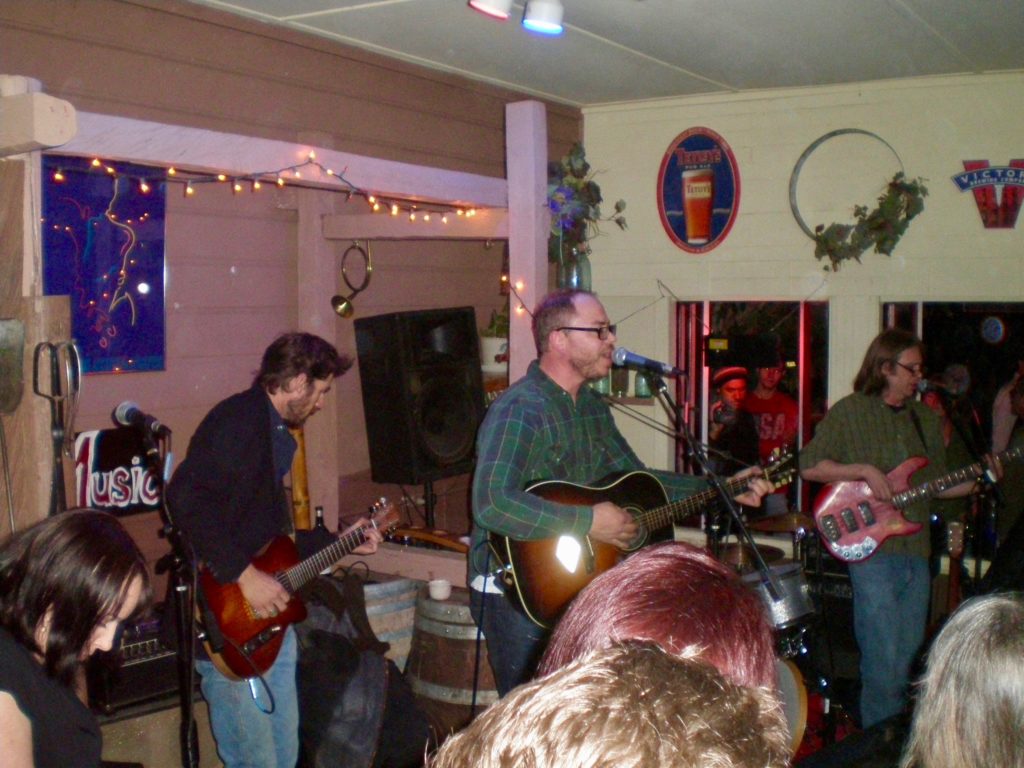
The deal
In 2000, Forever Goldrush was signed by Cargo Records, a growing label with divisions in the United States and Germany. That year the band recorded its second album, Halo In My Backpack.
Halo’s songs were marked by the same brooding hint of bull’s breath as Unknown Territory, just with more kicking grit and electric drive. The band’s creative output was reaching a fevered pitch. They soon played The Great American Music Hall, San Francisco’s oldest and most revered venue, then returned to Sacramento to draw an ocean of fans to Concerts in the Park. That was an evening that ended with the crowd rocking along to Wyckoff’s channeling of Merle Haggard as he sang “Working Man Blues.” Things kept coming together. Sound engineers who’d worked with Johnny Cash wanted to record Forever Goldrush. Producers who’d worked with Whiskey Town wanted in on their next album.
Wyckoff admits he began to see fame in his headlights a little too soon.
As the band worked on songs for its third disc, Cargo Records closed the American wing of its company. Forever Goldrush’s drummer departed. Instead of blockbuster shows, it was back to playing dim bars and seedy hotels. Potential deals with other record labels fell through, and Forever Goldrush’s third album took almost a year to record — and then almost 10 years to release. When it came out on Retroactive Records in 2011, fans were hearing a very different side of Wyckoff, Lacey and DeMusey.
“We called what we did in The Amador Frequency cosmic, outlaw pop,” Wyckoff explained with a chuckle. “We wanted it to be psychedelic, like Commander Cody meets Gram Parsons, or maybe Willie Nelson wearing a space helmet.”
For DeMusey, the endless hours of recording a genre without limitations remain one of his best memories.
“When it comes to the rewards of creativity, and having the best artistic outlet, that album The Amador Frequency has been my favorite experience,” the bassist said.
Still, the chances of making a professional go of things seemed more elusive than ever.
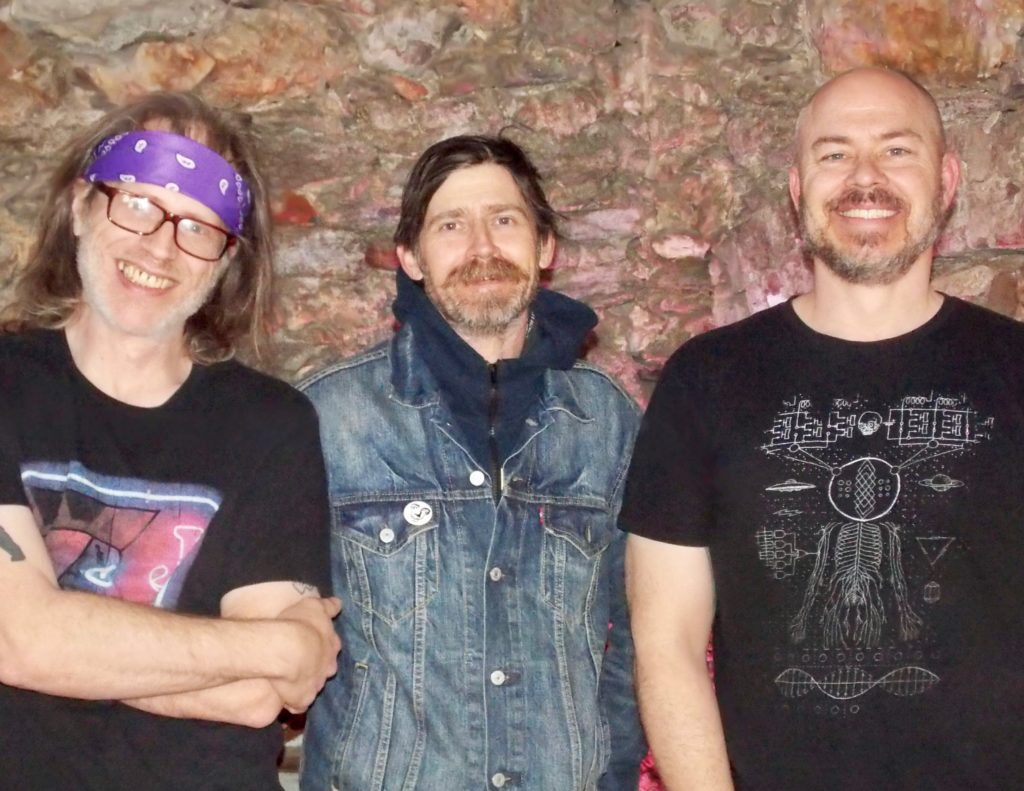
The seeds of a return
In the initial years after The Amador Frequency, Forever Goldrush only made rare appearances on stage. Its members were starting families and living separate lives. In 2014, they decided to cut another record, one that was more in the style and spirit of their first two discs. The result was Chambers, recorded as a simple four-piece assemble, with the magic happening inside an old movie theater converted to sound studio in Weed, California. Tony Cale sat in on drums. The album’s since become a favorite with some longtime listeners. Its acoustic guitar work is crisp. Its steel pedal slides are simmering. Its fat bass branding has a roots religiosity. One standout is “You and Me,” with its high-stepping stomp that cuts with swift vocal energy, culminating in the soaring chorus, “You and me / We have learned / About this world together/ Mountain lions and mountain tops.”
Chambers was as sonically deep as any collection the band had attempted: From the bold, ringing notes of “The Road,” to the back-looking, brandy-soaked bounce of “One for All,” the album’s pollinated by an introspection and maturity the Forever Goldrush boys had found in their mid-thirties. For Lacey, the experience of making it, and its overall quality, rates as his favorite experience.
“The development of the band — the songwriting and the musicianship — showed we’d grown so much that we could hit on all the best of what we had at that moment,” he recalled.
Wyckoff sees it as an album that encapsulates his life in the foothills, which he’s still pursuing in his songwriting.
“To me, Amador County is always that image of a guy standing on Box Beach in blue jeans, holding a Marlboro and a beer; or maybe watching your neighbor’s wife throw all his crap out onto the front yard,” Wyckoff reflected. “Those were images in my early songs. Now, I’m trying to show more depth. I’m trying to find stories that take a turn. I’m watching the subtleties of the guy waiting for his unemployment check, or the people on disability or hooked on meds. It’s all those struggles of everyday life that I’m interested in now.”
For DeMusey, Chambers was a comfortable endeavor, the gift of longtime musical friends being focused on nothing but the sound.
“You know, we came as close to making it as you possibly could,” he said of the group’s early records. “And I’m still proud of it, because not a lot of bands can say that.”
Ever since Chambers, Wyckoff, Lacey and DeMusey have wanted to bring Forever Goldrush back as a fully performing act. Career and family challenges kept getting in the way. But 25 years after picking up their instruments, they still smile when fans rave about “Songs Bottles are Broken To,” or say that “Sweet 65” is the best rockabilly song they’ve ever heard. That’s partly what has led to bringing their first album into the digital realm, while simultaneously starting work on a new one. Unknown Territory was just made available on iTunes Apple Music, Spotify, Twitch and Pandora. Forever Goldrush plans to have Halo In My Backpack and Chambers follow suit in the near future.
The name of the next album is still under wraps, but they’re working on it.
“We get together whenever we can, and we’re sharing music digitally,” Lacey said. “Now we’re using tech to our advantage to get some new material going. It’s been really inspiring.”
Wyckoff recently posted snippets of some new songs on Instagram. He was shocked by the amount of response.
“People just started coming out of nowhere saying they loved the style, and that they’re still here and want us to keep going, and we feel really lucky about that,” Wyckoff acknowledged. “Even when we disappeared for years, this band never really ended. Forever Goldrush just seems to go on and on.”
Scott Thomas Anderson is also the host of the ‘Drinkers with Writing Problems’ podcast.

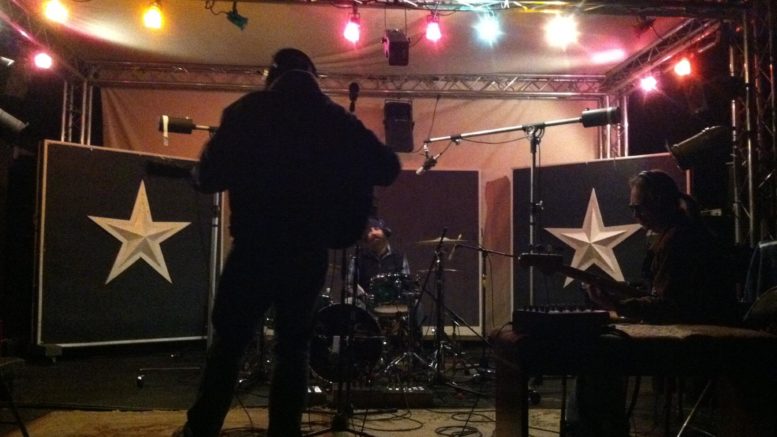

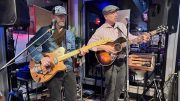
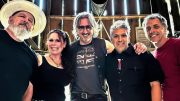
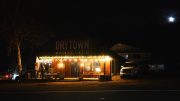
These men are as genuine as they were as adolescents, hanging out with my daughters and their circle of friends, and jamming together as teenagers. Their songs personify the spirit and timbre of their youth – driving the back roads, hanging out with friends on starry nights, and all the other adventures they experienced in the hills of Amador County – some up and some down. Rockabilly? Americana? Folksy Rock? No matter how you define their music, it’s just plain damned good!